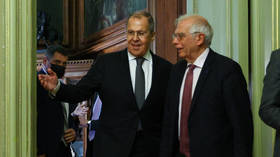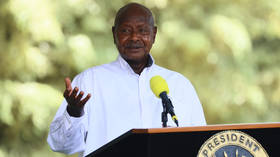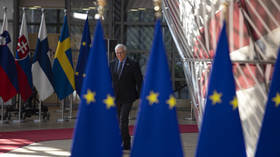Cover me, not Lavrov – EU's top diplomat tells media

EU foreign policy chief Josep Borrell has complained that he’s less popular with the Western media than Russia’s top diplomat Sergey Lavrov.
In an interview with Spanish radio station Cadena SER on Tuesday, Borrell touched on the Russian foreign minister’s recent tour of Egypt, DR Congo, Ethiopia and Uganda, saying: “Lavrov goes to Africa and tries to persuade the Africans that sanctions are to blame for all that’s happening... and the whole of the Western media repeats it.”
“I go to Africa to say the opposite, that sanctions have nothing to do with it, and nobody picks it up,” he lamented.
The EU foreign policy chief explained the attention Lavrov is getting, saying: “There’s a certain tendency to listen to the enemy, the adversary.”
“Lies circulate faster than the truth,” and because of this Brussels should “redouble” efforts to explain its stance to the public, he concluded.
The US news magazine Politico echoed the comparison between the diplomats’ Africa trips in an article on Monday, saying the contest for an African audience, between the EU and Russian diplomats, was “lopsided” in favour of Lavrov.
An opinion piece, explaining the role of the US and the EU in Africa’s food crisis, which the Russian foreign minister penned before his tour of the continent, was picked up by scores of local media outlets and shared by thousands of people on Facebook, it pointed out.
“Over the same time period, Josep Borrell… was a virtual ghost online, based on data from CrowdTangle, a social media analytics tool owned by Meta. He garnered just one mention on Facebook about Africa compared to Lavrov’s tidal wave of coverage,” Politico wrote.
According to the outlet, this situation “highlights what many within EU political circles have known for years, but few are willing to acknowledge publicly.”
In the information battle with Moscow, Brussels “remains outmatched, outgunned and under-resourced to combat the Kremlin's sophisticated playbook,” it concluded.
Last week, Ukraine, Russia, the UN and Turkey signed a deal to unblock exports of grain from Ukrainian ports. In addition, Russia and the United Nations signed a memorandum implying the UN’s involvement in lifting restrictions on the export of Russian grain and fertilizers to world markets.
Borrell welcomed the agreement, saying it “offers an opportunity to start reversing this negative course” set by Russia’s military operation in Ukraine, which has “endangered food security for millions of people.”
Russia has rejected Western claims that the blockage of grain exports from Ukraine’s Black Sea ports has put the world on the brink off a food crisis.
Speaking in the Egyptian capital Cairo on Sunday, Lavrov said the true cause of the problem was “illegitimate” restrictions imposed on Moscow by the US, EU and their allies, which have “prevented operations with Russian grain [food and fertilizers], including insurance, including the admission of our ships to foreign ports and foreign ships’ entry into Russian ports.”
Russia is not asking for all sanctions to be lifted, but “our Western colleagues... should remove the obstacles they themselves have created,” the foreign minister insisted.














